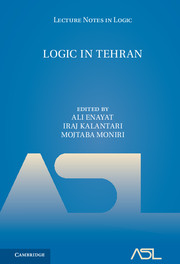Book contents
- Frontmatter
- Contents
- Preface
- Workshop and conference on logic, algebra, and arithmetic: Tehran, October 18–22, 2003
- Foreword
- Mathematical logic in Iran: A perspective
- Real closed fields and IP-sensitivity
- Categoricity and quantifier elimination for intuitionistic theories
- Primes and irreducibles in truncation integer parts of real closed fields
- On explicit definability in arithmetic
- From bounded arithmetic to second order arithmetic via automorphisms
- Local-global principles and approximation theorems
- Beatty sequences and the arithmetical hierarchy
- Specker's theorem, cluster points, and computable quantum functions
- Additive polynomials and their role in the model theory of valued fields
- Dense subfields of henselian fields, and integer parts
- A recursive nonstandard model for open induction with GCD property and cofinal primes
- Model theory of bounded arithmetic with applications to independence results
- Ibn-Sina's anticipation of the formulas of Buridan and Barcan
- Remarks on algebraic D-varieties and the model theory of differential fields
- A simple positive Robinson theory with LSTP ≠ STP
- Categories of theories and interpretations
- References
Categories of theories and interpretations
Published online by Cambridge University Press: 30 March 2017
- Frontmatter
- Contents
- Preface
- Workshop and conference on logic, algebra, and arithmetic: Tehran, October 18–22, 2003
- Foreword
- Mathematical logic in Iran: A perspective
- Real closed fields and IP-sensitivity
- Categoricity and quantifier elimination for intuitionistic theories
- Primes and irreducibles in truncation integer parts of real closed fields
- On explicit definability in arithmetic
- From bounded arithmetic to second order arithmetic via automorphisms
- Local-global principles and approximation theorems
- Beatty sequences and the arithmetical hierarchy
- Specker's theorem, cluster points, and computable quantum functions
- Additive polynomials and their role in the model theory of valued fields
- Dense subfields of henselian fields, and integer parts
- A recursive nonstandard model for open induction with GCD property and cofinal primes
- Model theory of bounded arithmetic with applications to independence results
- Ibn-Sina's anticipation of the formulas of Buridan and Barcan
- Remarks on algebraic D-varieties and the model theory of differential fields
- A simple positive Robinson theory with LSTP ≠ STP
- Categories of theories and interpretations
- References
Summary
Abstract.In this paper we study categories of theories and interpretations. In these categories, notions of sameness of theories, like synonymy, bi-interpretability and mutual interpretability, take the form of isomorphism.
We study the usual notions like monomorphism and product in the various categories. We provide some examples to separate notions across categories. In contrast, we show that, in some cases, notions in different categories do coincide. E.g., we can, under such-and-such conditions, infer synonymity of two theories from their being equivalent in the sense of a coarser equivalence relation.
We illustrate that the categories offer an appropriate framework for conceptual analysis of notions. For example, we provide a ‘coordinate free’ explication of the notion of axiom scheme. Also we give a closer analysis of the object-language/ meta-language distinction.
Our basic category can be enriched with a form of 2-structure. We use this 2-structure to characterize a salient subclass of interpretations, the direct interpretations, and we use the 2- structure to characterize induction. Using this last characterization, we prove a theorem that has as a consequence that, if two extensions of Peano Arithmetic in the arithmetical language are synonymous, then they are identical.
Finally, we study preservation of properties over certain morphisms.
Introduction.Interpretations are ubiquitous in mathematics and logic. Some of the greatest achievements of mathematics, like the internal models of non-euclidean geometries are, in essence, interpretations.
Given the importance of interpretations, it would seem that there is some room for a systematic study of interpretations and interpretability as objects in their own right. This paper is an attempt to initiate one such line of enquiry. It is devoted to the study of the category of interpretations, or, more precisely the study of a sequence of categories of interpretations.
Below, I will briefly address three issues: motivation & desiderata, comparison to some earlier work, and comparison to boolean morphisms.
Motivation & Desiderata.The fact that interpretations play an important role in mathematics does not ipso facto mean that we should study them in a systematic way. Perhaps, as a totality, they are too diverse to make systematic study sensible. Perhaps, the only general insights are trite and not very useful.
- Type
- Chapter
- Information
- Logic in Tehran , pp. 284 - 341Publisher: Cambridge University PressPrint publication year: 2006
References
- 11
- Cited by

